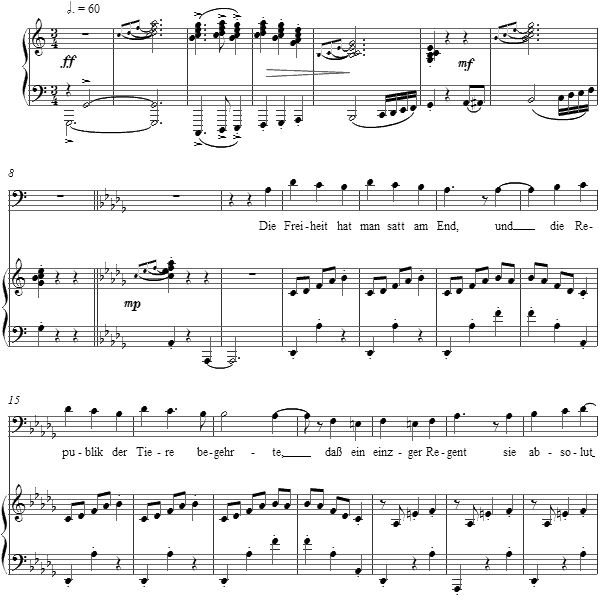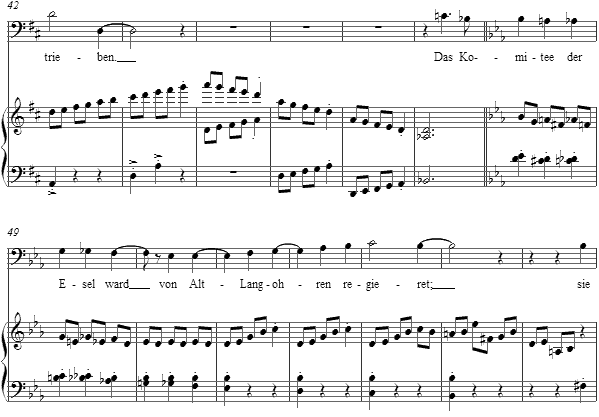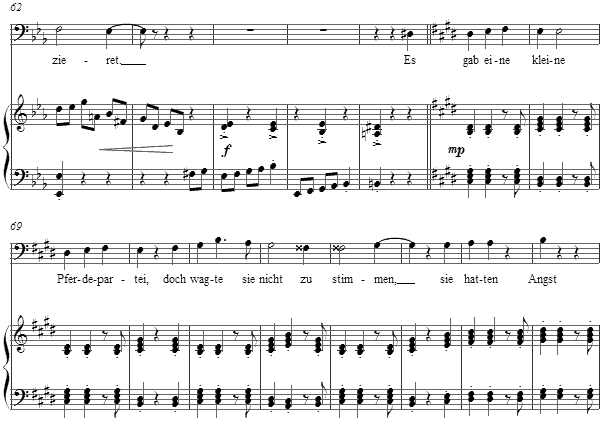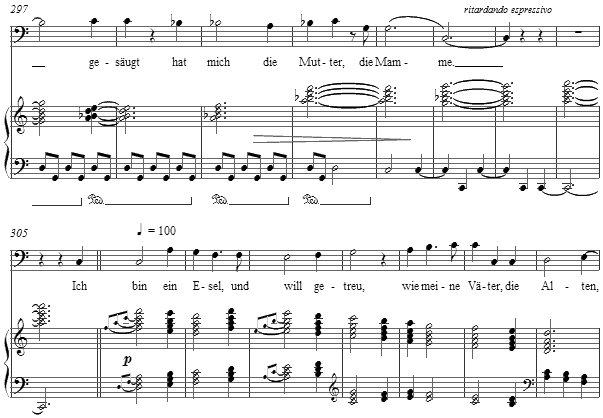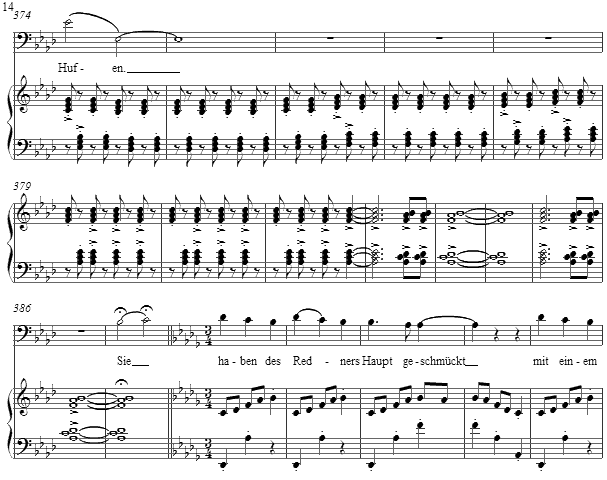Music and Texts of GARY BACHLUND
Vocal Music | Piano | Organ | Chamber Music | Orchestral | Articles and Commentary | Poems and Stories | Miscellany | FAQs
Die Wahl-Esel - (2010)
Heinrich Heine
for baritone and piano
Die Freiheit hat man satt am End,
Und die Republik der Tiere
Begehrte, daß ein einzger Regent
Sie absolut regiere.
Jedwede Tiergattung versammelte sich,
Wahlzettel wurden geschrieben;
Parteisucht wütete fürchterlich,
Intrigen wurden getrieben.
Das Komitee der Esel ward
Von Alt-Langohren regieret;
Sie hatten die Köpfe mit einer Kokard,
Die schwarz-rot-gold, verzieret.
Es gab eine kleine Pferdepartei,
Doch wagte sie nicht zu stimmen;
Sie hatte Angst vor dem Geschrei
Der Alt-Langohren, der grimmen.
Als einer jedoch die Kandidatur
Des Rosses empfahl, mit Zeter
Ein Alt-Langohr in die Rede ihm fuhr,
Und schrie: Du bist ein Verräter!
Du bist ein Verräter, es fließt in dir
Kein Tropfen vom Eselsblute;
Du bist kein Esel, ich glaube schier,
Dich warf eine welsche Stute.
Du stammst vom Zebra vielleicht, die Haut
Sie ist gestreift zebräisch;
Auch deiner Stimme näselnder Laut
Klingt ziemlich ägyptisch-hebräisch.
Und wärst du kein Fremdling, so bist du doch nur
Verstandesesel, ein kalter;
Du kennst nicht die Tiefen der Eselsnatur,
Dir klingt nicht ihr mystischer Psalter.
Ich aber versenkte die Seele ganz
In jenes süße Gedösel;
Ich bin ein Esel, in meinem Schwanz
Ist jedes Haar ein Esel.
Ich bin kein Römling, ich bin kein Slav;
Ein deutscher Esel bin ich,
Gleich meinen Vätern. Sie waren so brav,
So pflanzenwüchsig, so sinnig.
Sie spielten nicht mit Galanterei
Frivole Lasterspiele;
Sie trabten täglich, frisch-fromm-fröhlich-frei,
Mit ihren Säcken zur Mühle.
Die Väter sind nicht tot! Im Grab
Nur ihre Häute liegen,
Die sterblichen Hüllen. Vom Himmel herab
Schaun sie auf uns mit Vergnügen.
Verklärte Esel im Gloria-Licht!
Wir wollen Euch immer gleichen
Und niemals von dem Pfad der Pflicht
Nur einen Fingerbreit weichen.
O welche Wonne, ein Esel zu sein!
Ein Enkel von solchen Langohren!
Ich möcht es von allen Dächern schrein:
Ich bin als ein Esel geboren.
Der große Esel, der mich erzeugt,
Er war von deutschem Stamme;
Mit deutscher Eselsmilch gesäugt
Hat mich die Mutter, die Mamme.
Ich bin ein Esel, und will getreu,
Wie meine Väter, die Alten,
An der alten, lieben Eselei,
Am Eseltume halten.
Und weil ich ein Esel, so rat ich Euch,
Den Esel zum König zu wählen;
Wir stiften das große Eselreich,
Wo nur die Esel befehlen.
Wir alle sind Esel! I-A! I-A!
Wir sind keine Pferdeknechte.
Fort mit den Rossen! Es lebe, hurra!
Der König vom Eselsgeschlechte!
So sprach der Patriot. Im Saal
Die Esel Beifall rufen.
Sie waren alle national,
Und stampften mit den Hufen.
Sie haben des Redners Haupt geschmückt
Mit einem Eichenkranze.
Er dankte stumm, und hochbeglückt
Wedelt' er mit dem Schwanze.[ 14 pages, circa 7' 30" ]
Heinrich Heine in 1829
We know from Heine's life that he flirted with notions of the then novel ideas of socialism, abhorred centralized authority as he saw in Germany of that time, and spent the last twenty-five years of his life in France. Heine's association with Marx in France as well as his various editorial writings explain why his books were included in the book burning at the Opernplatz in Berlin under the Nazis. This long poem parodies politicians and their behind-the-scenes adherents in their search for what he correctly terms "absolute" rule. It is odd that while the poem was intended to parody Germany -- hence the citation of the national colors, "black, red and gold" -- what Heine in that time before Marx' opus foresaw the famed "dictatorship of the proletariat" failed to foresee is also what Erich Mühsam failed to foresee, that socialism was one in a number of various political creeds which in fact advance centralized power. For this historical naïveté and today's clearer historical vision, I take the poem to be both of its time, as well as universal as much art turns out to be, in parodying politics and politicians, and thereby title my rhymed paraphrase as follows...
Political Asses
They had tired of freedom --
The animal republic had --
And sought a single regent,
To rule absolutely, I add.
The animals gathered round
To write their election tracts;
Partisanship raged furiously.
Intrigues bloomed to pacts.
A committee of donkeys stood forth,
Led by the wily old Long-Ears;
On each one's head was a cockade,
Black, red and gold, to cheers.
The Horse Party was a minority
And none would venture opinion;
They feared the painful, braying shrieks
Of the old Long-Ears and their dominion.
When some ass simply dared propose
The candidacy of a horse,
All hell broke loose; one Long-Ears raged
"You are a traitor! You! Of course!
"A traitor, because not a single drop
Of donkey blood flows in you.
You are not a donkey, but likely
Were whelped by a Welsh she-ewe.
"Perhaps you stem from zebras, the skin
Striped and resembling the zebra;
Also your voice is nasal and loud,
Sounding like Egyptian or Hebra'.
"And if you are not a foreigner, you surely are
A plainly common sort of ass.
You cannot fathom our donkey nature,
Nor through its Psalter's mysteries pass.
"But I have immersed my soul, wholly
In the mysteries to which we are heir;
I am such a true ass, and as to my tail
There is donkey in its every hair.
"I am not a Roman, nor am I a slave;
I am a fine, staunch German ass,
Just like my forefathers. They were so brave,
Vegetarian, of the cleverest class.
"They did not toy with gallantry,
Or play a frivolous game;
They trotted, frisky-loyal-happy-free,
To the mill with sacks, not with shame.
"Our fathers are not dead! In their graves
Lie only a decaying shell,
Empty skins which die. From heaven
They see with pride in us and swell.
"Transfigured asses in glories' light!
We shall carry your flame,
And will never stray from our asses' path,
Not even were we lame.
"Oh, the joys of being a donkey,
Offspring from such Long-Ears.
I shall shout it from every roof:
A proud donkey should lead his peers.
"That great donkey that sired me,
Of strong, German stock was he;
On donkey's milk was I suckled
By my mother when I was wee.
"I am a donkey. I shall be true,
Like my elders of the Long-Ears line,
To our old and proven donkey ways,
And the donkey spirit, so fine.
"And because I am a donkey, I advise,
We elect a donkey as our king;
We will found a mighty ass empire,
Where donkeys rule over everything.
"We are asses! Hee-haw! Hee-haw!
And never be vassals to the horse.
Down with the horse! Long life, hurrah!
The king should be an Ass, of course."
So spoke the patriot, and in the hall,
The donkeys' applause roared loud.
They felt a nationalism surge within,
And stamped their hooves, quite proud.
They crowned that speaker’s head
With an honored oak leaf wreath.
He thanked them, mute from gratitude,
His donkey tail wiggling beneath.
Rhymed paraphrase by the composer
The twenty quatrains are treated, first by a successive set of rising half step tonal domains. The introduction is founded on C, but the first verse immediately reveals the tried-and-true scheme. Much of the setting is in 3/4 time, lilting along at first with a light-hearted counterpoint to the notion of electing an "absolute" ruler.
The first break in textures arrives at the third stanza, with the downward, half-step succession of major seven chords in the accompaniment under the vocal line which comes to clarify the tonal region of E flat, after following the downward draw of the "political committee."
A next crucial textural change occurs as the rhythmic punctuation of repeated chords introduces the "opposition" which seems to form, but remains easily shouted down. For this the vocal line also breaks into shorter phrases and, at the word "fear," a single note.
The onrushing setting moves through many verses and tonal domains, coming to rest as the personal recollection of mother and remaining "true" to one's heritage in invoked by the speaker. For this, the "in one" tempo now slows to a yet more lyrical 3/4.
The end of the political stump speech, Heine tells, is greeted by hooves stamped on the floor. For this the alternation of right and left hand triads races forward, finally uniting as some audience applause has done, into a rhythmic unison. The poem's summary statement brings return to the initial D flat in which the text began. The setting ends with a single, fortissimo "I-A!"
The score for Die Wahl-Esel is available as a free PDF download, though any major commercial performance or recording of the work is prohibited without prior arrangement with the composer. Click on the graphic below for this piano-vocal score.

